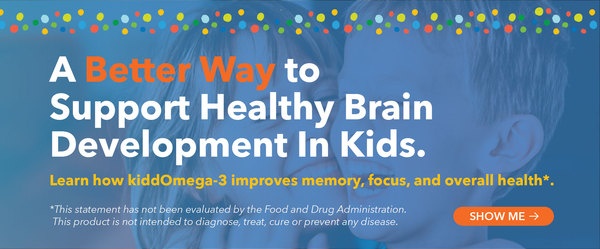
Dr. Armen Nikogosian, MD
For most parents, the health of their children is of the utmost importance, especially during the first few years. However, many don’t realize how vital it is to begin this care before the child is even born. The majority of a child’s growth and development are dependent on the nutrients absorbed from the mother during pregnancy.
When it comes to brain health DHA, an omega-3 fatty acid, is one of the crucial components needed for proper neurological development and function in the first two years of a child’s life, starting in utero. Mothers-to-be should highly consider adding DHA to their diets to support the wellbeing and overall health of their child.
What Is Our Brain Made Of?
Phospholipids are fats with a variety of functions, but in the context of brain health, they create the membrane of the neuron and the synapse. Three particular phospholipids are essential for the proper development of the nervous system:
- Phosphatidylethanolamine (PE) is particularly important in memory formation in the hippocampus
- Phosphatidylcholine (PC) is one of the primary phospholipids for cell membrane stability and the neuronal synapse
- Phosphatidylserine (PS) is important in cell signaling, as this is how brain cells and neurons communicate
Our brains are made up of approximately 60% phospholipids or fatty acids. DHA, or docosahexaenoic acid, makes up about 30% of the fatty acids in our brains, and it is a critical component for the rapid neural growth that occurs during the first two years of a child’s life, starting from the third trimester in utero.1

What Is DHA?
DHA is one of three components of omega-3 fatty acids. The other two include eicosapentaenoic acid (EPA) and alpha-linolenic acid (ALA). DHA plays a crucial role in neurological development, visual acuity, and making sure that the different phospholipids are forming properly. DHA is vital for regulating the inflammatory pathway by reducing the production of pro-inflammatory mediator proteins and regulating calcium flux involved in neuron cell communication.
While EPA and ALA are important, it takes a lot of effort for the body to adequately convert both of these types to the more readily usable form of DHA. In children under the age of two, that conversion is not very efficient, and conversion efficiency drops after the ages of 20 to 25. So, ensuring that children under the age of two are getting a significant source of DHA is a necessity for brain development.2
Diet and DHA Intake
Obtaining healthy levels of DHA in both the mother’s and the child’s diet can be difficult, especially for those choosing a vegetarian or vegan lifestyle. Since DHA is an animal-sourced fatty acid, women who eat a vegan or vegetarian diet may find that they are unable to get the right amount of DHA strictly from eating plant-based omega-3s. A study looking at adult conversion of ALA to EPA to DHA with a background diet high in saturated fats found that the conversion to EPA and DHA was 6% and 3.8%, respectively.3
Choosing supplements made from algae, which is naturally high in DHA, is an excellent option for women who want to maintain their lifestyle choices and stay true to their ethics. Those looking to get pregnant, no matter their diet, should consider increasing their omega-3 intake—either via diet or supplementation—to support the development of their child’s neurological system.
DHA Levels in Utero and Child Brain Development
DHA has been linked with cognitive function, visual acuity, and above all, brain development. Scientists studying the generational effects of low DHA levels on nervous system functions in rats found that a single generation of DHA deficiency was not as significant as three consecutive generations of DHA deficiency.
Findings showed that when there was a DHA deficiency in the mother and grandmother rat, it resulted in the grandchild having 85% overall DHA deficiency. These results suggest that there is an element of multiple generations stacking on top of one another, which implies a strong reliance of the infant on the mother’s DHA stores.4
The scientists also looked at what would happen if they took the multiple-generation DHA deficient rats and supplemented them with an enhanced DHA diet. The study showed a significant replenishment of DHA levels within eight weeks after initiation of the repletion diet. To put it in layman's terms, there is no need for doom and gloom if you are pregnant and have not obtained enough DHA in your diet to supply your child. An enhanced diet of DHA during the first year or so of your child’s life may provide the support they need to develop a healthy nervous system and brain.4
DHA and EPA Dosage Recommendations for Young Children
While DHA is the most important omega-3 component since it makes up half of the brain's fatty acid content, obtaining EPA will provide support for your child's brain as well. Omega-3 supplementation doses vary depending on if your child is neurotypical or if they have some neurodevelopmental delay or brain abnormality. The list below highlights the recommended dosages of omega-3s for both of these groups of children.
Omega-3 dose for kids in need of extra neurodevelopmental support:
- DHA: 800-1200 mg/day
- EPA: 1000-1500 mg/day
Omega-3 dose for neurotypical kids:
- DHA: 400 mg/day
- EPA: 400 mg/day
It's worth noting that some people may experience the occasional bloody nose, as high levels of EPA are known to thin the blood a little. It is always recommended that you start your child on the lower end of the recommended dosage and work your way up.
DHA Is an Essential Component for Healthy Brain Development
DHA is an omega-3 component that has been resurfacing in studies and on the shelves as more and more researchers are identifying the vital role that it plays in our bodies. Though DHA deficiencies in children under the age of two can cause issues related to neurological development, parents can help by upping the mother’s DHA levels during pregnancy and supplementing their children’s diet. Luckily, there are numerous options available, so parents can get their kid’s health on the right path —even before they leave the womb.
Armen Nikogosian, MD practices functional and integrative medicine in Henderson, Nevada. He is Board Certified in Internal Medicine and a member of the Institute for Functional Medicine (IFM) and the Medical Academy of Pediatric Special Needs (MAPS). His practice focuses on treatment of complex medical conditions with a special emphasis on Autism Spectrum Disorder in children and autoimmune conditions in adults.

Sources:
1 “DHA Effects in Brain Development and Function - NCBI.” 2016. https://www.ncbi.nlm.nih.gov/pmc/articles/PMC4728620/. Accessed September 23, 2019.
2 "Why DHA Is Critical For Brain Health In Infants - Dr. Nicole Beurkens.” 2018. https://www.drbeurkens.com/dha-is-critical-for-infants/. Accessed September 23, 2019.
3 “Can Adults Adequately Convert Alpha-Linolenic Acid… - NCBI”. 1998. https://www.ncbi.nlm.nih.gov/pubmed/9637947. Accessed September 23, 2019.
4 “Reversal of Docosahexaenoic Acid Deficiency… - NCBI.” 2001. https://www.ncbi.nlm.nih.gov/pubmed/11254754. Accessed September 23, 2019."


















